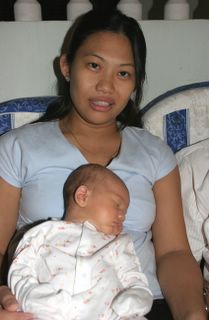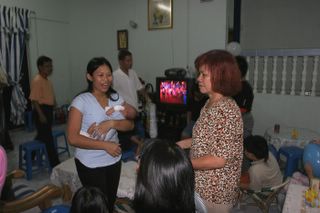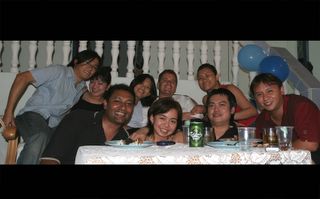DEEPAVALI or Diwali means "a row of lights".
There are various alleged origins attributed to this festival. Some hold that they celebrate the marriage of Lakshmi with Lord Vishnu. In Bengal, the festival is dedicated to the worship of Kali. It also commemorates that blessed day on which the triumphant Lord Rama returned to Ayodhya after defeating Ravana. On this day also Sri Krishna killed the demon Narakasura.

In Malaysia, it is celebrated as the day the evil Narakasura was slain by Lord Krishna. The triumph of light over darkness and good over evil. The mood starts a month beforehand with the preparation of the various array of Indian cookies such as murukku, ommapadi, chippi, atharasum, nei orundei and the wall breaker kallu orundei. Of course, there is the inevitable shopping and work to be done that requires everything to be new and clean, from curtains to clothes for family members. Normally on Deepavali eve, Padayai or offerings and prayers are made to ancestors and deceased family members. After this ceremony, the women are busy in the kitchen while the rest of the family do the house by hanging new curtains, placing new settee covers and the like to welcome Laxmi, the goddess of prosperity.
Getting up early before sunrise, oil is applied on heads and a bath is taken. This ritual oil bath is known as "ganga-snanam" and is done to cleanse one of the impurities of the past year. Prayers are held at the family altar, after which the family gathers before the elders to receive their blessings.
Then the guests come by and food cooked is prepared "halal" or kosher so as to be served to Malay Muslims. Here again, the concept of open house is seen and an intermingling of friends of different races come by to greet a Happy Deepavali. It also is a great opportunity to dig in on some delicious Indian curry and cookies.
Most Malaysian Indians are South Indian Hindus in origin. Here, even though Deepavali is known as the festival of lights, there are no oil lamps being lit. Rather it is usually done on another religious festival called Karthigal Villaku which comes about a month later.
The most happiest celebrants are, of course, the children who collect gleefully the yellow packets with money in them - a mutation of the Chinese red ang pow packets. Revelers try to squeeze the the month-long festivities into one day of public holiday and four to five days of leave from work.
I wish everyone Happy Deepavali especially My Darling, his family & all my friends. I wish I could be there to celebrate with you but work beckons me...maybe next year..?
LynnAD



















